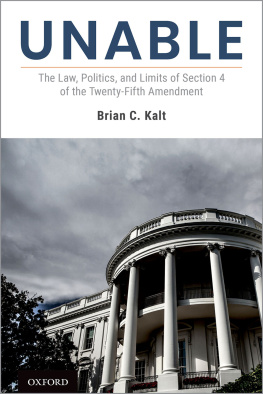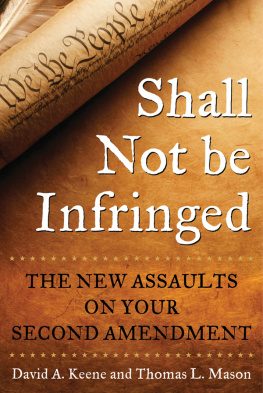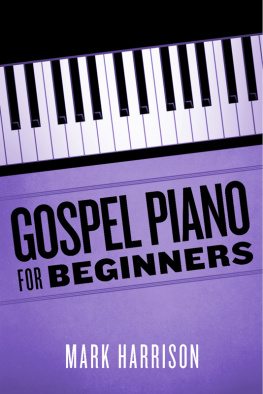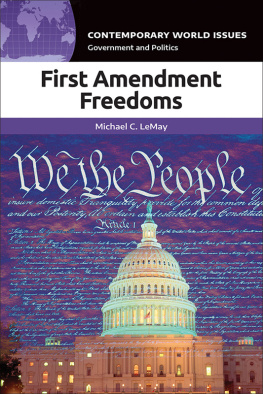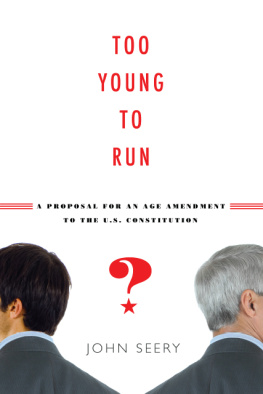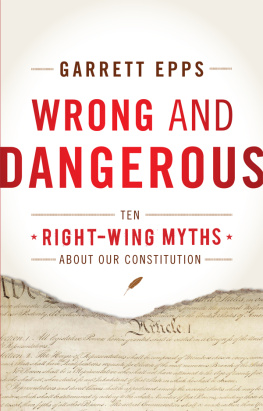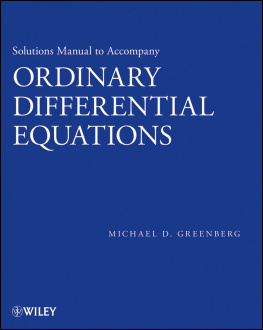Unable

Oxford University Press is a department of the University of Oxford. It furthers the Universitys objective of excellence in research, scholarship, and education by publishing worldwide. Oxford is a registered trademark of Oxford University Press in the UK and certain other countries.
Published in the United States of America by Oxford University Press
198 Madison Avenue, New York, NY 10016, United States of America.
Brian C. Kalt 2019
All rights reserved. No part of this publication may be reproduced, stored in a retrieval system, or transmitted, in any form or by any means, without the prior permission in writing of Oxford University Press, or as expressly permitted by law, by license, or under terms agreed with the appropriate reproduction rights organization. Inquiries concerning reproduction outside the scope of the above should be sent to the Rights Department,
Oxford University Press, at the address above.
You must not circulate this work in any other form and you must impose this same condition on any acquirer.
Library of Congress Cataloging-in-Publication Data
Names: Kalt, Brian C., 1972 author.
Title: Unable : the law, politics, and limits of Section 4 of the Twenty-Fifth Amendment /
Brian C. Kalt.
Description: Cambridge, United Kingdom ; New York, NY : Oxford University Press, 2019. |
Includes bibliographical references and index.
Identifiers: LCCN 2019019356 | ISBN 9780190083199 (hardback) |
ISBN 9780190083229 (online) | ISBN 9780190083205 (updf) |ISBN 9780190083212 (epub)
Subjects: LCSH: United States. Constitution. 25th Amendment. |PresidentsSuccession
United States.
Classification: LCC KF5082 .K35 2017 | DDC 342.73/062dc23
LC record available at https://lccn.loc.gov/2019019356
Note to Readers
This publication is designed to provide accurate and authoritative information in regard to the subject matter covered. It is based upon sources believed to be accurate and reliable and is intended to be current as of the time it was written. It is sold with the understanding that the publisher is not engaged in rendering legal, accounting, or other professional services. If legal advice or other expert assistance is required, the services of a competent professional person should be sought. Also, to confirm that the information has not been affected or changed by recent developments, traditional legal research techniques should be used, including checking primary sources where appropriate.
(Based on the Declaration of Principles jointly adopted by a Committee of the American Bar Association and a Committee of Publishers and Associations.)
You may order this or any other Oxford University Press publicationby visiting the Oxford University Press website at www.oup.com.
In memory of Paula Kalt
Contents
of my 2012 book, Constitutional Cliffhangers: A Legal Guide for Presidents and Their Enemies. Thank you to Yale University Press for graciously extending its permission for my use here of that material.
Thanks to Richard Albert, Josh Blackman, Brittany Campbell, Josh Chafetz, John Feerick, Brad Gray, Sara K. Kalt, Aldina Kennedy, Kristen Lare, Gerard Magliocca, Derek Muller, David Pozen, David Priess, Sara Sellers, Jorge E. Souss, Samantha Whitehouse, Lindsay Willett, and Elif Wisecup for their helpful input. Reb Brownell and Joel Goldstein deserve special recognition for their particularly thorough comments.
Thanks also to those who provided the outstanding research support for which Michigan State University College of Law is justly proud: librarians Barbara Bean, Brent Domann, Robin Doutre, Allison Eicher, and Jane Meland; and my research assistant Suzanne Rorhus, who kept me on track and believing in this project.
In 1919, the United States had a problem: Thomas Marshall wasnt President.
He should have been, according to the Constitution. President Woodrow Wilson had suffered a paralyzing stroke and no one in the government had seen him for weeks. The Constitution directed the Vice President to take over when the President was unable to function. Wilson was definitely unable to function, and Thomas Marshall was definitely the Vice President... yet there they were.
The problem was that while the Constitution said what was supposed to happen, it said nothing about how. Several people, including Cabinet members and congressional leaders, quietly urged Marshall to take charge. But Wilsons inner circle did not want Marshall in control or themselves excluded, and Congress made no official declarations. Marshall decided not to act. After several months Wilson recovered well enough to emerge from seclusion and complete his term, though he was never quite the same. The nation surely suffered from the months-long power vacuum.
Decades later, in 1967, the Constitution added clarity on presidential inability in the form of Sections 3 and 4 of the Twenty-Fifth Amendment. Finally, there was a way for the country to avoid debacles like Wilsons and ensure a functional hand was always at the helm. The Twenty-Fifth Amendment is a vast improvement over the original Constitution.
* * *
When a fictional U.S. Presidents grip on power is threatened in books, TV shows, and films, the Twenty-Fifth Amendment takes center stage. From the President battling airborne terrorists in Air Force One to Presidents wrestling with their Cabinets for control on 24 and Homeland, the dramatic potential is obvious: put the worlds most powerful office on a shaky foundation and the spectacle practically writes itself.
In real life, the Twenty-Fifth Amendments dramatic potential has stayed unrealized. The amendments less-interesting inability provision, Section 3, has been invoked three times by Presidents about to be sedated for medical procedures. Simple and straightforward, Section 3 allows the President to declare himself disabled and pass power temporarily to the Vice President. Then, when the President declares himself recovered he retakes power immediately.
Sooner or later, though, there will be a disabled President who cannot or will not invoke Section 3. Whatever the causewhether the President is comatose, lost, senile, stark raving mad, or otherwise unable to communicatethe Presidents inability will leave the country leaderless. That is where the more-interesting Section 4 comes in, setting out a detailed process by which the Vice President and Cabinet can temporarily sideline the President without his consent.
Section 4s text is confusing in places and it leaves several crucial questions unanswered without outside information. Section 4s portrayal by Hollywoodsensationalized and often inaccuratehas not helped matters. This book will dispel the confusion and debunk some common misunderstandings about Section 4. It will also contemplate how Section 4 might work (or not) in practice in various situations, ranging from the routine to the extraordinary.
The bottom line is that while many people might like to use Section 4 to address all sorts of presidential dysfunction, Section 4 is designed to be a viable option only in extreme cases. It is no coincidence that, to date, Section 4 has never been invoked. This books title, Unable, has a double meaning. It refers to Section 4s key requirement: that the President be unable to discharge the powers and duties of his office. But it also refers to the fact that a dysfunctional Presidents opponents will be unable to use Section 4 as easily as they might like.

